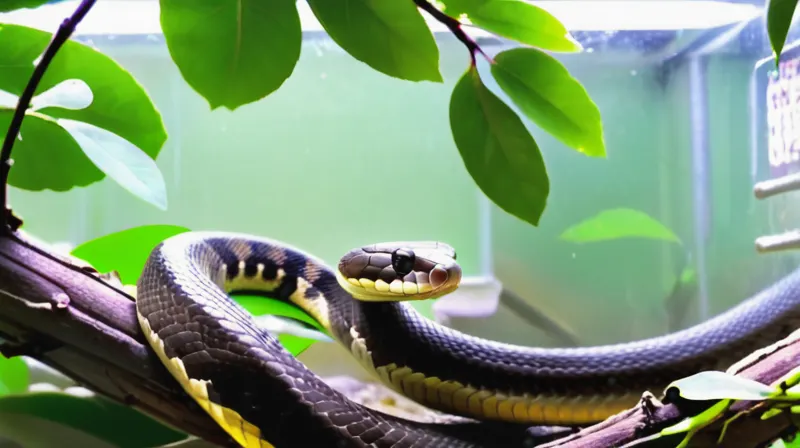Will bleach kill a snake? Probably not if used with care, but there are safer alternatives.

Key Points
Will Bleach Kill a Snake if Used for Cleaning?
Household cleaning products play a significant role in maintaining a clean and healthy living environment.
However, when it comes to owning reptiles such as snakes, pet owners must exercise caution and awareness of the potential risks these products can pose.
One commonly used household cleaning product that raises concerns among snake owners is bleach.
Will bleach kill a Snake? By understanding the effects of household cleaning products on reptiles, particularly snakes, we aim to ensure the safety and well-being of their scaly companions.
The Toxicity of Bleach on Snakes
How bleach can harm a snake’s respiratory system and skin upon contact
The toxicity of bleach on snakes can have severe consequences on their respiratory system and skin upon contact.
When snakes are exposed to bleach, the fumes can be harmful if inhaled, leading to respiratory issues such as difficulty breathing or even respiratory failure.
Direct contact with bleach can cause irritation and damage to a snake’s skin, potentially leading to burns or other serious injuries.
It is crucial to keep snakes away from any products containing bleach to ensure their safety and well-being.
- Toxicity: Bleach contains active ingredients like sodium hypochlorite, which, when ingested or even inhaled in high concentrations, can be toxic to snakes and other wildlife.
- Skin Irritation: Direct contact with bleach can cause irritation and chemical burns on the skin of snakes, leading to discomfort and potential injury.
- Environmental Impact: Discharging bleach into the environment, whether intentionally or inadvertently, can disrupt ecosystems and harm non-targeted species, including beneficial wildlife.
Safe Alternatives to Bleach for Snake Enclosures
When it comes to cleaning snake enclosures, safety is paramount for both the reptiles and their human caretakers.
While bleach is a common disinfectant, its strong chemical properties may not be suitable for all situations, especially when dealing with sensitive reptiles like snakes. Fortunately, there are safe and effective alternatives that you can use to maintain a clean environment for your snake.
1. Vinegar Solution
Ingredients:
- Distilled white vinegar
- Water
- Spray bottle
Instructions:
- Mix equal parts of distilled white vinegar and water in a spray bottle.
- Shake the bottle well to ensure thorough mixing.
- Spray the solution onto the surfaces of the snake enclosure.
- Let it sit for a few minutes to allow the vinegar to effectively disinfect.
- Wipe down the enclosure with a clean cloth or paper towel.
- Allow the enclosure to air dry completely before reintroducing the snake.
Benefits:
- Vinegar is a natural disinfectant that is safe for reptiles when used in appropriate dilutions.
- It effectively kills bacteria, viruses, and mold spores without leaving harmful residues.
- Vinegar also helps neutralize odors, leaving the enclosure smelling fresh.
2. Hydrogen Peroxide Solution
Ingredients:
- 3% hydrogen peroxide solution
- Water
- Spray bottle
Instructions:
- Dilute the hydrogen peroxide with water in a 1:1 ratio.
- Transfer the solution into a spray bottle.
- Shake well to mix the solution thoroughly.
- Spray the diluted hydrogen peroxide onto the surfaces of the snake enclosure.
- Allow it to sit for a few minutes to disinfect.
- Wipe down the enclosure with a clean cloth or paper towel.
- Ensure the enclosure is completely dry before reintroducing the snake.
Benefits:
- Hydrogen peroxide is a gentle disinfectant that breaks down into water and oxygen, making it safe for reptiles.
- It effectively kills bacteria, viruses, and fungi without posing harm to the environment.
- Hydrogen peroxide is also known for its mild bleaching properties, helping to brighten and sanitize surfaces.
3. Soap
Soap is a fundamental cleaning agent, crafted through the amalgamation of water with specific types of fat, such as lard, and a basic, or alkali, salt like lye. In comparison to disinfectants, soap holds a reputation for being remarkably safe, natural, and eco-friendly.
Beyond its basic composition, soap serves as a crucial tool in reducing the concentration of microorganisms by aiding in their removal. It excels at eliminating organic debris, a vital step prior to employing most disinfectants. Whether it’s grease, blood, feces, or food residue, soap effectively neutralizes many disinfecting agents.
- For reptile owners, opting for a reliable soap is essential. Specialized options like Zilla’s Terrarium Cleaner and Exo Terra’s Terrarium Decor Cleaner offer formulations specifically designed to ensure safety when used around reptiles.
Additional Tips for Cleaning Snake Enclosures
In addition to using vinegar or hydrogen peroxide solutions, here are some extra tips to ensure thorough cleaning and maintenance of snake enclosures:
- Regular Cleaning Schedule: Establish a routine cleaning schedule to prevent the buildup of waste and bacteria in the enclosure. Aim to clean surfaces and change bedding regularly.
- Remove Food Debris: Remove any uneaten food items or feces promptly to maintain a hygienic environment for your snake.
- Natural Sunlight: Whenever possible, expose the enclosure to natural sunlight, as UV rays have natural disinfectant properties that can help keep the enclosure clean and sanitary.
- Proper Ventilation: Ensure adequate ventilation in the enclosure to prevent the buildup of moisture, which can promote bacterial growth.
- Use Safe Substrates: Choose substrates that are easy to clean and non-toxic to snakes. Avoid substrates that may harbor bacteria or mold.
By incorporating these safe cleaning alternatives and practices into your snake care routine, you can ensure a clean and healthy environment for your beloved reptile companion.
Always prioritize the safety and well-being of your snake when selecting cleaning products and methods.
Sources
What should I use to clean and disinfect my reptile’s enclosure? – DubiaRoaches.com. Dubiaroaches.com. Published 2020. Accessed March 29, 2024. https://faq.dubiaroaches.com
Disinfectants and their Uses.
Beautifuldragons.com. Published 2024. Accessed March 29, 2024. http://www.beautifuldragons.com